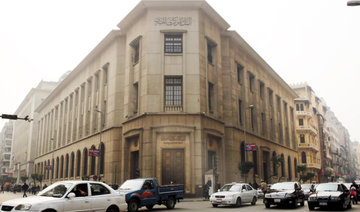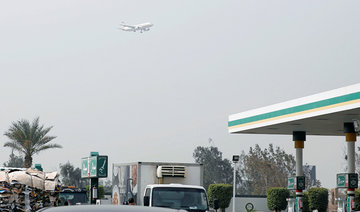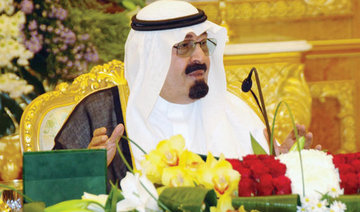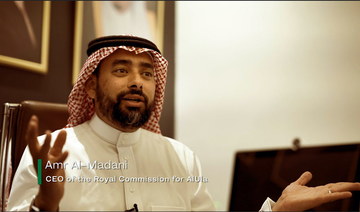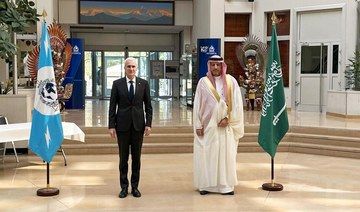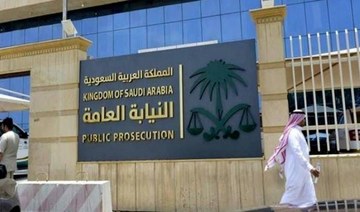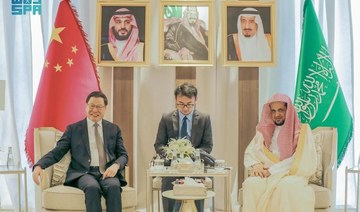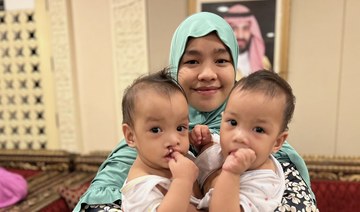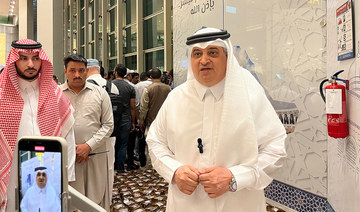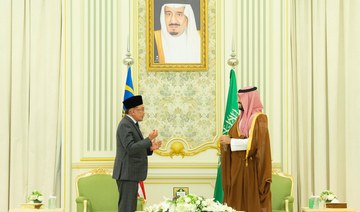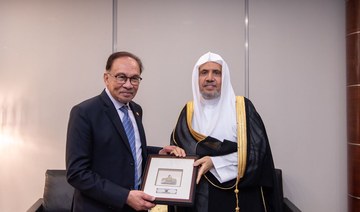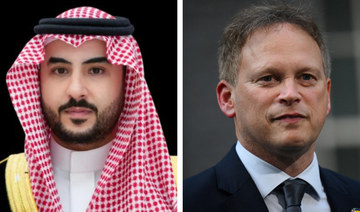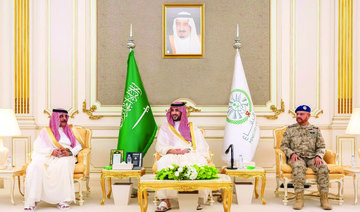CAIRO: The visit by Crown Prince Mohammed bin Salman to Egypt comes as Saudi investment in the country continues to grow, boosted by easing trade restrictions, a weak Egyptian pound and plans for a bridge linking the two countries.
The Egyptian government is pushing to make foreign investment in the country easier to help the economy recover from the tumultuous period that followed the Arab Spring.
Saudi Minister of State Essam bin Saad bin Saeed said last week that the Kingdom is keen to enhance economic relations with Egypt and intends to pump money into new investments in the country.
According to the Egyptian state news agency MENA, Saudi investments in Egypt top those of other Arab countries.
At the Saudi-Egyptian Business Council last month in Cairo, Egyptian Minister of Trade and Industry Tariq Qabeel said the volume of trade exchange between the two countries in 2017 amounted to about $2.1 billion and that the volume of Saudi investments in Egypt exceeded $6 billion — about 11 percent of all foreign investments in Egypt.
President of the General Federation of Egyptian Chambers of Commerce Ahmed Al-Wakil, said the total Saudi investments in Egypt are worth up to $27 billion, which are spread across 2,900 projects in a huge variety of product and service sectors.
The Kingdom is also the second largest in terms of tourism — accounting for millions of dollars a year, according to Egyptian Ministry of Tourism figures.
The UAE and Kuwait have also been big investors in Egypt since Abdel Fattah El-Sisi became president.
The scale of Saudi Arabia’s investment is expected to increase after officials from Egypt and the Kingdom said they wanted to reduce the number of obstacles between the two countries by standardizing rules and making it easier to transport goods and services between the two.
Egypt has also become a more attractive prospect for investors since the central bank liberalized the exchange rate in November 2016 as part of a $12 billion International Monetary Fund reform program. The pound lost half of its value after the float.
The improved investment environment in Egypt means some major Saudi companies are considering establishing more projects in the Egyptian market.
A number of Saudi businessmen view some of the new cities being built in Egypt as strong investment opportunities.
The most important Saudi investments in Egypt are in the service sector, including energy, transport, logistics, health and education.
The Egyptian-Saudi Electricity Exchange Project, a scheme agreed in 2011 to connect the two countries’ power grids, is probably the most important investment to date.
Minister of Electricity and Renewable Energy, Dr. Mohammad Shaker, said in December that work is ongoing on the project but that the electrical connection lines between the two countries are expected to run in early 2021.
The King Salman Bridge project, which Egyptian sources said would be discussed during Prince Mohammed’s visit, will link Sharm El-Sheikh to the Tabuk region of northern Saudi Arabia.
Construction of the 50-kilometer bridge was announced during King Salman’s visit to Egypt in 2016. The bridge will help pilgrims, tourists and expatriate workers to travel easily between the countries and offer a significant improvement in trade between the two countries.
The bridge is also expected to boost energy links. Dr. Jamal Al-Kalioubi, a professor of petroleum and energy engineering, said the bridge would be one of the important ways to secure the oil and gas needs of neighboring Arab countries.
The visit is also expected to boost energy cooperation. The Egyptian government announced on Thursday that it had agreed with Saudi Aramco to supply 500,000 barrels per month of crude oil to the Egyptian refineries for six months from January to June. The Saudi National Oil Company had already provided oil to the Egyptian refineries in November and December 2017 on a trial basis.
During King Salman’s 2016 visit to Egypt, Riyadh agreed to supply Cairo with 700,000 tons of refined oil products per month for five years.
King Salman witnessed the signing of 21 agreements and investment memorandums of understanding between the two countries, most notably for the establishment of a free trade area in northern Sinai, which is the first important economic project linked to the construction of the bridge.
Saudi Arabia’s economic investments in Egypt run deep
Saudi Arabia’s economic investments in Egypt run deep
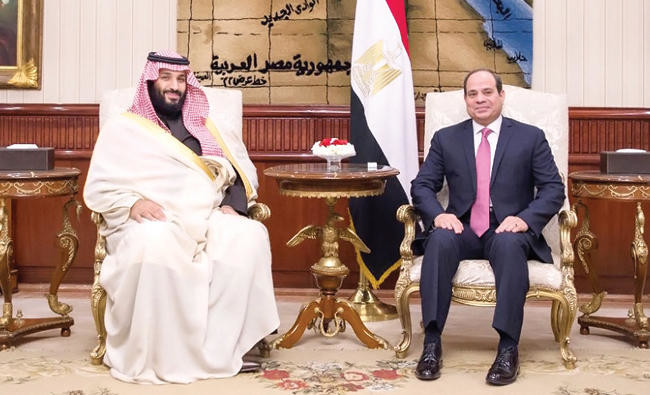
Saudi anti-corruption authority reveals details of recent cases

- Spokesman said legal procedures had been initiated against all perpetrators
RIYADH: A spokesman for Saudi Arabia’s Oversight and Anti-Corruption Authority, also known as Nazaha, revealed on Sunday details of a number of criminal cases it recently investigated and prosecuted.
Outlining 20 of the most prominent corruption cases, he said legal procedures had been initiated against all perpetrators.
In one case, two Central Bank employees were arrested for receiving sums of money from a resident, who was also arrested, in exchange for depositing more than SR7.3 million ($1.95 million), without verifying the source, into bank accounts belonging to commercial entities over a two-year period.
In another case, a security officer working at the General Department of Traffic was arrested for receiving SR387,000 from the owner of a public services office, who was also arrested, in exchange for illegally amending the essential data of a group of vehicles.
One of the cases also highlighted involved an employee working at a university hospital who was arrested for receiving SR100,000 from citizens in exchange for a promise to employ them at the university.
Nazaha said it continues to work to identify and prosecute anyone in the Kingdom involved in the embezzlement of public funds, guilty of abuse of power and position for personal gain, or otherwise harming the public interest.
It stressed that guilty parties will be pursued and held accountable, and that there is no statute of limitations on such crimes.
Saudi, Bahraini public prosecutor meet in Manama
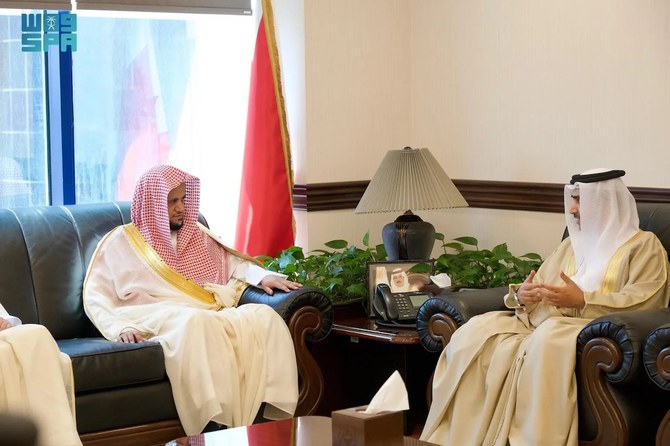
- Al-Mujeb highlighted the unwavering support the Kingdom's public prosecution receives from its leadership
RIYADH: Saudi Public Prosecutor Sheikh Saud bin Abdullah Al-Mujeb met with his Bahraini counterpart Ali bin Fadl Al Buainain in Manama, Saudi Press Agency reported on Sunday.
Al-Buainain welcomed Al-Mujeb and his accompanying delegation and expressed his delight at the visit, which he said signified the ongoing exchange of visits between the judicial bodies of the two nations and the sustained collaboration in combating transnational crime.
During the meeting, Al-Mujeb emphasized the deep-rooted historical ties between the Bahrain and the Kingdom and their continued advancement across various sectors, particularly in parliamentary cooperation and the exchange of information to ensure regional security.
He highlighted the unwavering support the Kingdom's public prosecution receives from its leadership, which he said enhanced the efficiency of its judicial processes.
Conjoined Filipino twins arrive in Riyadh for surgery

- Parents convey appreciation to King Salman, Crown Prince Mohammed bin Salman
RIYADH: Conjoined Filipino twins arrived in Riyadh from Manila on Sunday following a Saudi evacuation plan coordinated by the Ministry of Health, the Saudi Press Agency reported.
Akhizah and Ayeesha Yusoph were born in Panabo City in the Davao del Norte province on the southern island of Mindanao in December 2022. Their bodies share one liver.
The two 16-month-old girls arrived at King Khalid International Airport and traveled to the King Abdullah Specialized Children’s Hospital to be assessed to determine the feasibility of separation surgery.
Abdullah Al-Rabeeah, supervisor general of the Saudi aid agency KSrelief, thanked the Kingdom’s leadership for their support of the flagship Saudi Conjoined Twins Program.
The program, which is spearheaded by Al-Rabeeah, has operated on more than 130 children from 25 countries since 1990. The children were born sharing internal organs with their twin.
Al-Rabeeah spoke of the program’s global significance which marks a milestone in the field of medicine, while aligning with the ambitious goals of Saudi Vision 2030 to elevate the Kingdom’s healthcare services.
The parents of Akhizah and Ayeesha conveyed their heartfelt appreciation to King Salman and Crown Prince Mohammed bin Salman for the warm welcome and generous hospitality extended to them following their arrival in the Kingdom.
Frankly Speaking: How are Saudi-Malaysian bilateral relations faring?
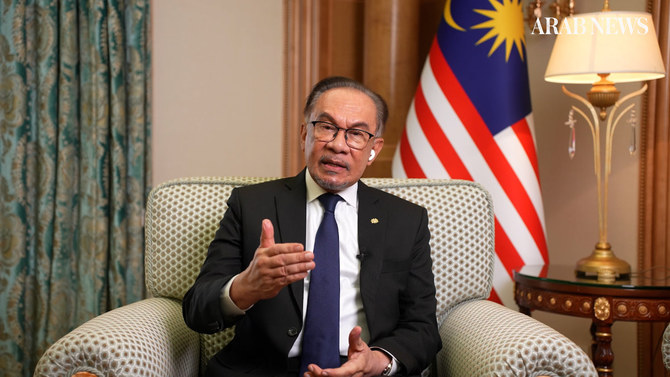
- Prime Minister Anwar Ibrahim highlights close alignment between Malaysia’s Madani economic framework and Saudi Vision 2030, resulting in a “win-win” for both countries
- Says ties have experienced “phenomenal advance” in terms of trade and investment, sheds light on his friendship with Crown Prince Mohammed bin Salman
DUBAI: Saudi-Malaysia bilateral relations have experienced “phenomenal advance” over the past decade in terms of trade and investment, resulting in a “win-win” for both countries, Anwar Ibrahim, the prime minister of Malaysia, has said.
Speaking to Katie Jensen, host of the Arab News current affairs program “Frankly Speaking,” during a visit to Riyadh for a special meeting of the World Economic Forum last week, Anwar said he would like to see accelerated deepening of ties.
Even compared with six months ago, when he attended the Gulf Cooperation Council’s joint summit with the Association of Southeast Asian Nations in Riyadh in October, Anwar said the “two-way traffic” of investment had advanced.
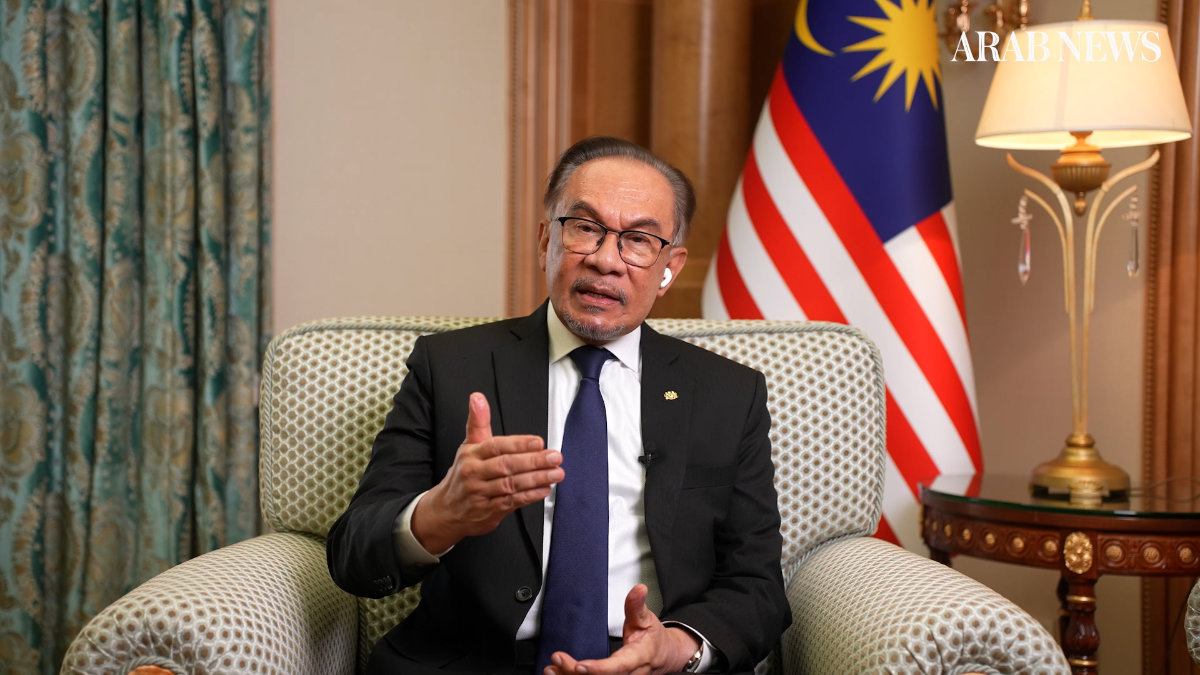
“It was a phenomenal advance and improvement in terms of trade, investments, not only in oil and gas by Aramco, but also by leading Saudi companies,” he said in a wide-ranging interview covering development, diplomacy and the fight against corruption.
“A lot of Malaysian companies, too, are involved here, of course, in a smaller scale, in many of NEOM’s and in some of the energy transition programs. And I’m pleased that this two-way traffic is advancing.
“In my discussions with the crown prince, I would like to urge that this be further accelerated because that would be a win-win for both countries.”
Anwar’s personal friendship with Saudi Crown Prince and Prime Minister Mohammed bin Salman is part of the reason for this burgeoning bilateral relationship, which has in turn bolstered the GCC-ASEAN partnership.
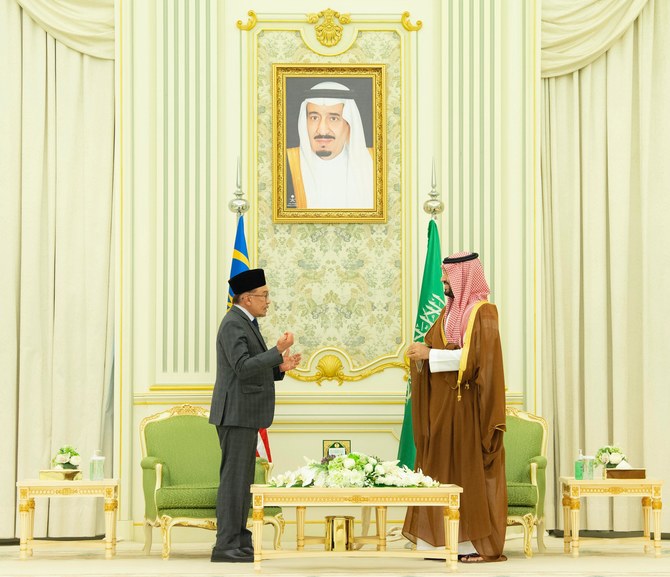
“I must say that I’m fortunate because Crown Prince Mohammed bin Salman considered me as a friend,” said Anwar, who met the crown prince during his visit for the World Economic Forum.
“We do exchange notes from time to time and he personally requested me to be present, and gives me a good opportunity to express some of the concerns and more so to be focused on economic development, on the relationships that it covers, particularly in terms of trade and investments.
“And I think he’s very forthcoming, he’s serious, he’s very determined and he’s tough. And that is to me a credit, particularly when it comes to bilateral relations. Enough rhetoric, enough pious platitudes. We want action and effective economic programs among our countries and the region, which include, therefore, ASEAN and the GCC.”
ALSO READ: Malaysian PM condemns West’s ‘sheer hypocrisy’ over Gaza war
Saudi Arabia and Malaysia also share much in common in terms of their respective economic development programs, which Anwar says are closely aligned.
While the Kingdom recently celebrated the eighth anniversary of its social reform and economic diversification agenda — Vision 2030 — Malaysia is likewise making strides with its own development plan — the Madani economic framework.
Launched in July 2023, less than a year after Anwar became prime minister, the framework aims to position Malaysia among the world’s 30 largest economies, its top 25 least corrupt countries according to the Corruptions Perceptions Index, top 12 in the Global Competitiveness Index and top 25 in the Human Development Index.
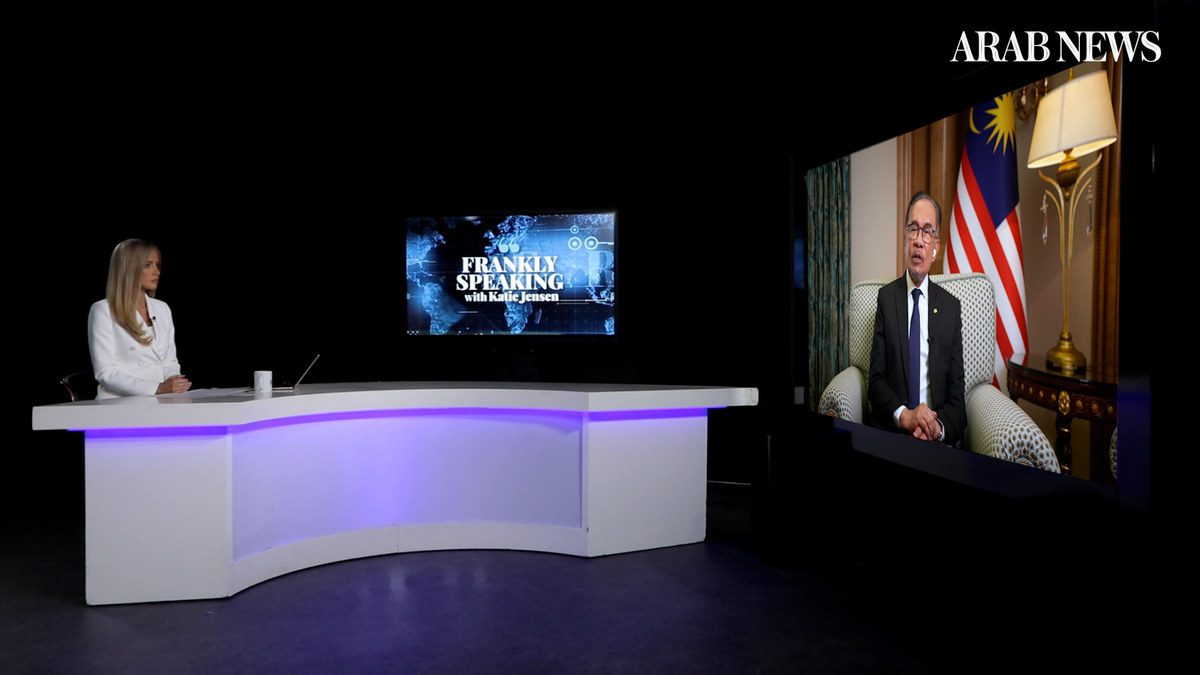
Malaysia also aims to raise its female labor force participation rate to 60 percent and lower its fiscal deficit to 3 percent and lower. To succeed in this reform agenda, Anwar intends to weed out corruption, implement good governance, boost foreign and domestic direct investment, and raise wages.
“I studied Vision 2030 extensively,” said Anwar. “And during the session we had during the World Economic Forum, we had an opportunity to engage with Crown Prince Mohammed bin Salman for an hour asking questions on how he then sees this vision coming.”
He added: “We are now moving ahead to deal with issues that would affect the future of the world, particularly the emerging economies … dealing with energy, with digital, with technology, with quality education, with good public health service, with AI.
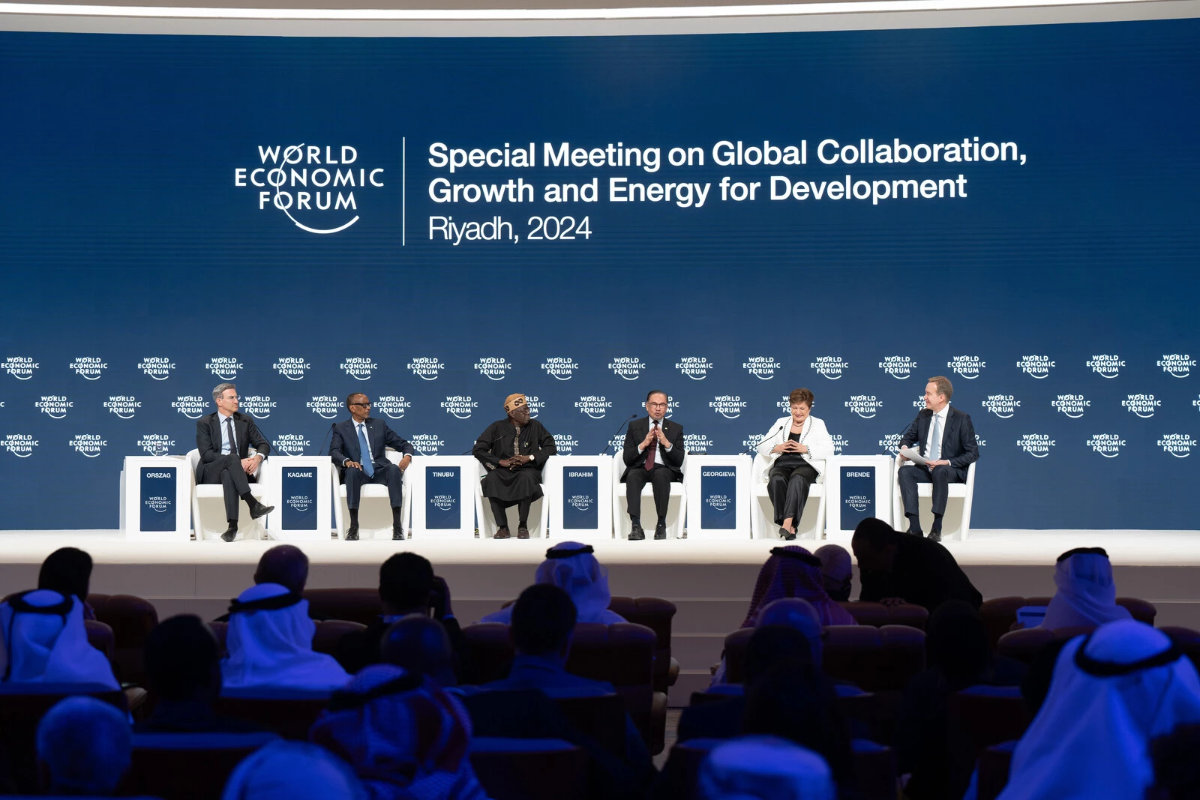
“And I think this is the direction which is consistent with the Madani, because we also talk about civilization and values and integrity and, more importantly, the issue of good governance.”
A shared economic trajectory is not the only thing Saudi Arabia and Malaysia have in common. Both nations have also pursued their own independent foreign policy, without submitting to the demands of powerful allies or choosing sides in superpower rivalries.
“Firstly, we are not tied to this xenophobic view of viewing China in a negative sense,” said Anwar. “As a neighbor, we have not encountered problems with them.
“Of course, there are teething issues which we do encounter with all our neighbors and countries, but we maintain excellent relations, which would enormously benefit Malaysia as an emerging economy: Investments, trade and even cultural exchanges.
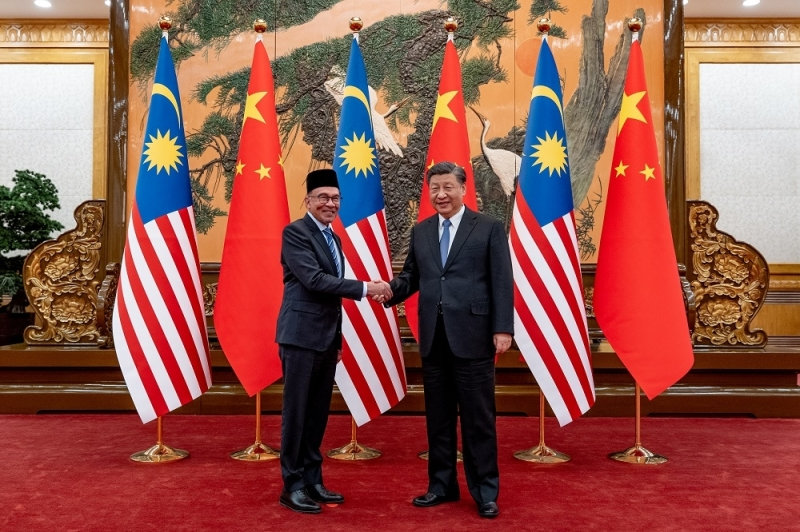
“And we also have a very strong presence of the ethnic Chinese in Malaysia. And I think to deny them a right of engaging would be futile.
“At the same time, as I have said earlier, cumulatively, the US remains the most important trading partner. And we are comfortable with it. We have benefited from its training, the technology transfer and also the workforce.
“Now there’s a continued presence of European countries, including Germany. And I think, why can’t we be just friends and engage with everybody? And those who are having problems should not impose and dictate their policies to the smaller economies, because we cannot afford to have that.
“There’s no reason whatsoever for us to be involved in that sort of a trade war, or bifurcation or tense relations between these countries.”
On the domestic front, Anwar has been true to his word on combating corruption. The Malaysian Anti-Corruption Commission has confirmed it is investigating former Prime Minister Mahathir Mohamad in connection with a case involving his sons, Mirzan Mahathir and Mokhzani Mahathir, who have been ordered to declare their assets.
Mahathir is a vocal critic of Anwar, who served as his deputy during the 1990s before being jailed. Anwar has denied accusations of using his anti-corruption drive to settle an old political score.
“We cannot deny the fact that any effective measure to combat corruption would invite some negative political remarks,” said Anwar.
“So, are we suggesting that effective anti-corruption moves should avoid dealing with past corrupt leaders? Of course, the answer is no, because then the public would think that if you belong in a certain level, then you should be safe, excluded from these operations.
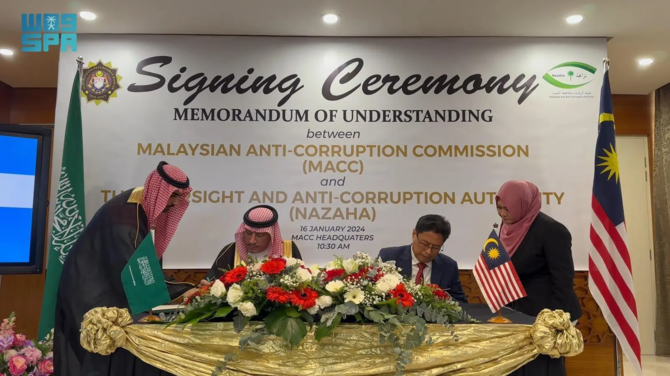
“So, I leave it entirely to the Anti-Corruption Commission. They do not consult me. My instructions are clear: We must stop the rot. It does not matter what the position, present or past. If you find basic reasons to suggest that investigations must be conducted fairly and professionally, please do so, because you cannot be selective, whether they are in the government or opposition, whether present leaders or past leaders.
“Otherwise, leaders like me will take the opportunity. You amass wealth as much as possible, quietly, and then later I’ll be safe because past leaders should not be touched. I think this is not the position that we take.
“I started this administration with clear calls. Good governance to rid the country of the scourge of corruption, which has led to so much waste. The endemic corruption is a scourge because it has condemned the society and the poor have suffered due to this. And many of our programs have been somewhat scuttled.
“So, we will proceed regardless. And it does not bother me in terms of the political reaction, because the Anti-Corruption Commission must remain independent and professional.”

Saudi defense minister meets with Burkinabe counterpart
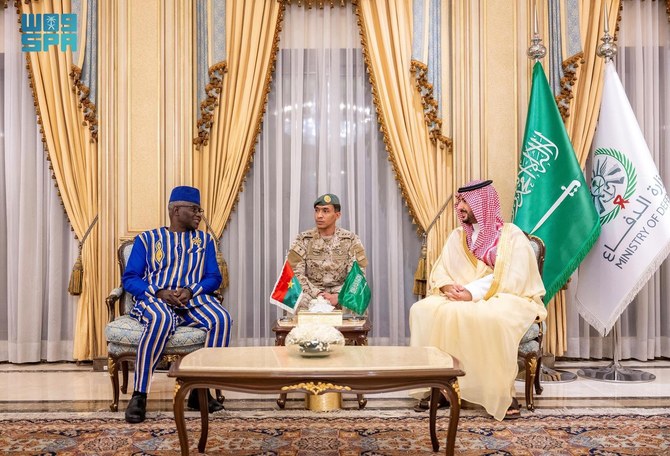
- The ministers discussed regional and international developments and efforts made with regard to them
RIYADH: Saudi Arabia’s Defense Minister Prince Khalid bin Salman met with Burkina Faso’s Minister of Defense and Veterans Affairs Kassoum Coulibaly in Riyadh on Sunday.
During the meeting, relations between the two countries and military and defense cooperation were discussed.
The ministers also discussed regional and international developments and efforts made with regard to them.



